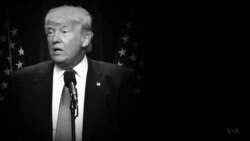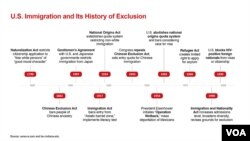After Sunday’s mass shooting in Orlando, Florida, by a gunman claiming allegiance to the Islamic State group, Donald Trump expanded on his controversial proposal to ban Muslim immigration.
"The immigration laws of the United States give the president powers to suspend entry into the country of any class of persons," the presumptive GOP presidential nominee said at a speech this week in the swing state of New Hampshire. Trump promised that, if elected, he would "suspend immigration from areas of the world when there is a proven history of terrorism against the United States, Europe or our allies, until we fully understand how to end these threats."
How does the United States determine who should be allowed entry? And what authority does a U.S. president have to bar the gates?
First off, the federal government tries to keep out anyone who poses a potential threat to the nation’s security and stability. Foreign nationals seeking legal entry to the United States face layers of screening to get a visa or green card. The AllLaw website lists a dozen major grounds for denying admission, ranging from communicable disease to criminal convictions to likely welfare dependency to terrorism.
Presidential authority
The U.S. president has broad authority to bar individuals or groups, based on the United States Code and the Immigration and Nationality Act of 1952.
The code says the president, by issuing a proclamation, can restrict or suspend "the entry of any aliens or of any class of aliens [who] would be detrimental to the interests of the United States."
Once entered into the Federal Registry, the proclamation gets added to the list of grounds for visa ineligibility, which State Department personnel consult in making determinations.
Current proclamations
The current list of 16 presidential proclamations on immigration are specific – banning individuals or groups of bad actors for, say, interfering with the return of constitutional rule in Haiti or belonging to Sierra Leone’s military junta.
None of these proclamations blocks U.S. entry based on religion. And none reaches the scale of what Trump is suggesting.
Trump initially called for “a total and complete shutdown of Muslims entering the United States" following the December terrorist attack in San Bernardino, California. The Los Angeles Times this week quoted a former Department of Homeland Security official as saying that Trump likely expanded his scope to deflect criticism that he’d targeted a single faith.
Questions arise
The Times said Trump’s proposed ban probably would be legal. But "barring entire religions and nationalities would almost certainly invite a court challenge and Supreme Court justices could raise questions about the use of such sweeping power, particularly by religious test."
The CNN news organization estimated Trump’s proposed broader ban ultimately would encompass 40 countries and millions of non-immigrants holding U.S. visas. The news organization based its findings on the annual State Department global terrorism reports released earlier this month.
One of the 12 countries identified as "terrorist safe havens" is Afghanistan, from which American-born gunman Omar Mateen’s parents emigrated.
Among more recent bans:
1954 – Operation Wetback. The government effort, with its outdated epithet, targeted illegal Mexican farmworkers for deportation. It led to the removal of nearly 300,000 Latinos, according to the Times, with most raids taking place in communities near the U.S.-Mexican border.
1980 – Iranians. A proclamation by President Jimmy Carter, a Democrat, banned Iranians from entering the United States after militants took Americans hostage at the U.S. Embassy in Tehran in 1979.
1987 – HIV/AIDS. As the AIDS epidemic was peaking, the United States imposed a medical ban on individuals diagnosed with the communicable disease. It was lifted in 2009.







